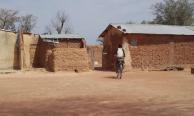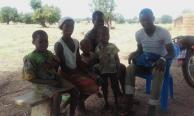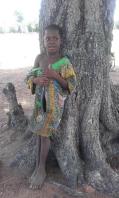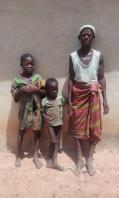Profile
Blog
Photos
Videos
Whilst I was volunteering with ATE in Lawra last year, we were asked whether there is a high level of iodine deficiency amongst the women in the district, which is known to be a major cause of congenital disabilities. The simple lack of sufficiently iodised salt in women's daily diets can leave babies at risk of being born with developmental disabilities both mentally and physically.
Without data being readily available from the Ghana Health Service (GHS), we partnered with them to carry out a quick and simple study to find out.
We agreed to carry out goiter screening of women of child bearing age. This enlargement of the thyroid gland can be easily detected and taken as a very basic indicator of severe iodine deficiency.
In four weeks, we managed to hold meetings with various traditional community leaders and brief Community Health Officers (CHOs) within seven Community Health Service Programme zones and screened over 850 women of child bearing age across the district.
It was an incredible experience and we saw a range of cases in women both young and old, but the most shocking and visible were in older women who must have been lacking iodine in their diets for a very long time.
In a way, this is not surprising for a number of reasons. Despite Ghana being the biggest producer of salt in West Africa, for the hundreds of small salt producers eking out a living here, it is not cost effective for them to iodise their salt. Due to the tropical climate (the sunlight, heat and moisture in the air) most of the iodine in the fortified salt which actually reaches the remote district of Lawra, will have been lost by the time it reaches the dinner plate. There is little awareness of the importance of iodine in daily diets, but in Lawra that almost becomes a moot point, when as we know, at certain times of year many households in Lawra can only afford one meal a day and simply getting enough food to eat at all is a real challenge.
Having drafted a report of our findings at the end of last year, we have 62 referrals to make to the Lawra Hospital to be diagnosed by a GHS Clinician.
After a few meetings with the District Health Administrator, management team personnel and one of the clinicians, we gained the go ahead to invite the women for a diagnostic screening next Thursday. So, on a couple of afternoons, I jumped on the back of a moto with a GHS representative to deliver the names of those women invited to attend an appointment, to the CHOs in their area. We travelled all over, from Dikpe across to Boo, making great loops of the district past land now being prepared for planting yams, millet and maize.
I'm thrilled that the women that we identified for referral through the initial goiter screening process will now have a follow up screening for diagnosis and access the medical advice they may need.
- comments










